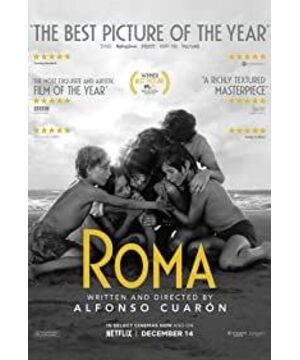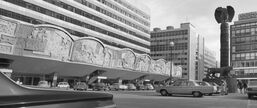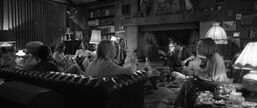The film is an autobiographical film by director Alfonso Cuaron. According to the director himself, 90% of the plot in "Roma" comes from his own real experience. The prototype of the protagonist Cleo is Libo, the maid of the original director's house. At the same time, the film shows the real student riots, class conflicts and political changes that have existed in history. It truly recreates Mexico's booming but turbulent economy before and after 1970. It also conveys the director's thoughts and sighs on Mexico's history and contemporary society. .
Class, Men and Women - Two Oppressions and Betrayals
There are two pairs of starkly opposite contradictions in this film. On the one hand, the white elite represented by the director's family and the manor's "uncle" and the peasant class such as Cleo; on the other hand, "Papa" Antonio, Fermin The opposition between the male power represented and female characters such as "Mom" Sophia and Cleo.
The first is class conflict. At the end of the 1960s, Mexico’s economy took off, hosting the Olympic Games (1968) and the World Cup (1970) one after another, but the opposite was the shattering of popular democratic political illusions: the bloody suppression of student movements, the massacre of the poor (especially the indigenous poor) ), expropriation of land, etc., revealing the “complex, intertwined contradictions of class and race” in Mexican society.
Compared with the more obscure class contradictions, the film emphasizes the contradictions between men and women in terms of emotions and social roles. The director deliberately depicts male characters who are fickle, hypocritical, and irresponsible through the contrast between the front and back, to bring out the strength and kindness of female characters.
Antonio is an upper-class male who has achieved financial freedom and a certain social status. His first appearance was holding a cigarette, holding the steering wheel, and playing classical music in the parking lot. His movements were slow and calm. During this period, the whole family looked at him with a look of anticipation of a saint. During the parking process, the camera only His hands, feet and beard on the temples were photographed, giving people a sense of seriousness, intimacy, and aloofness. Subsequent episodes also verified this feeling: as soon as Antonio arrived home, he complained loudly about the mess of the house and the failure of the servants, which scared Sophia to close the bedroom door; after that, when Antonio appeared again, he was already preparing to go to "Quebec" (actually to find mistress, and never return), all his words and deeds reflect Antonio's disgust and escape from this family. In stark contrast, the children run into Antonio on the way to the movies, playing with his mistress like a child.
Fermin is a homeless person. In the restaurant where Clio met for the first time, Fermin turned to let everyone pass by him and went out, and then quickly grabbed the Coke that Clio had not finished drinking and drank it, just like a typical ordinary citizen with no income; When Clio stated that he might be pregnant, he was extremely stiff on the pretext of going to the toilet and slipped away, and even discarded his coat, which showed his cowardice and incompetence. In stark contrast, Fermin waved a stick on the training ground to threaten Cleo not to come looking for him again. When swinging the stick, he was arrogant and domineering. Then he rushed into the furniture store and shot the students. is on the stronger side.
Antonio is tired of the serious upper class, and dilutes the responsibility with fun; Fermin is tired of the bottom life with nothing, and divides the responsibility with violence. The roles of the two "strong" and "weak" have a wonderful exchange, and ultimately both point to escape and betrayal. The male characters in the film wield power, power and choice, while the female is the weaker one. The shared destiny made Sophia let go of her class status, open her heart to Cleo, and finally let Cleo forget her unfortunate fate, embrace her family on the beach, and tell each other sincere friendship, because they don't care. Identity has become a weaker party in front of men.
The era behind the metaphor, the evolution of people's hearts
In October 1968, on the eve of the 19th Summer Olympics held in Mexico City, social contradictions gathered, and the students shouted the slogan "No Olympics, but revolution". The public house in Tlatelolco was killed, known as the "Night of Tlatelolco".
The movie is set in an era of drastic changes, and correspondingly, every character in the movie seems to be constantly changing. Changes become the clues and questions of the whole film.
Car·Family The huge body of the Galesi that Antonio drove for the first time on the scene obviously implied that he was out of tune with the family.
After Antonio left, the steering wheel that decided the fate of the family was in Sofia's hands. Sophia replaced the car with a small Laylo, and parked the car in the garage effortlessly, symbolizing Sophia's awakening of her independent spirit and adjustment and adaptation to her family life. She has since quit teaching and joined a publishing house to support her family.
Ring · T-shirt · Betrayal The director set up a prop for the two heartless men. When Antonio first arrived home, the camera captured him with a ring on his hand, indicating that he must have been wearing it when he went out; later, Cleo opened the drawer and saw the ring left by the hostess, which clearly showed that the relationship between the hostess and the hostess was broken. So she actually understood earlier than Sofia that Antonio would never return.
Fermin and Cleo said their goodbyes from the moment they met, Fermin wore the same T-shirt throughout, with the words "Amor es..." ( meaning what love is). It was a poignant mockery of Fermin's emotional play.
Cup Dead Baby Revolution
The cup symbolized the womb in the Mayan civilization, and there are similar descriptions in the Bible. A broken cup heralds the doom of the child in the womb, and a stillbirth almost bluntly hints at a revolution that has been stifled before it takes shape.
Love - where to lead the child and the whole world
Looking back on Alfonso Cuaron's directorial career, it is not difficult to find that all the films shot in his native Mexico have the connotation of national allegory, explicitly or implicitly revealing the influence of social development, race, race and class. Reflections on ethnic issues such as confrontation and violent revolution. Whether it's the debut work "Love in Hysteria", the famous work "Your Mother Too", or the pinnacle of "Roma", they are all as simple as a line drawing, without any music and dialogue. The lens is aimed at the transmutation of Mexico Society, or pushes flat on the vast Mexican plains, or switches between modern apartments and slums, or focuses on revolution from within the window...
However, in this film, although a chaotic and turbulent Mexican society is about to emerge, it is always a glimpse. The director has been using a distance that we cannot see to tell the revolution. The tide of the times seems to be detached from the life of the protagonist from beginning to end. In addition, demonstrations, revolutions, and massacres took place outside car windows, furniture stores, or inadvertently mentioned in the dialogues of the characters. The camera never recorded the revolutionaries directly, nor did they explain the cause and purpose of the revolution. It can be said that the director has always deliberately avoided the direct depiction of the revolution. Revolution, as the film's crucial description object, and even the actual protagonist, its specific face is completely ambiguous. "Roma" is therefore considered by many film critics to be "missing the creative subject" and "far from being profound enough".
I think this ambiguity is intentional. As a personal letter from the director himself, the meaning of this film is pure. The film won three Oscars, but in a way, it can only, and must, get the best director. If the film "Roma" is exquisite and beautiful, sincere and moving, it must be because of Cuaron. If it is said that its subject is missing, unclear or even narrow and shallow, then these limitations are also due to Cuaron. The director has repeatedly stressed that the film is "first and foremost a portrait of the women who raised me and with whom I had a close relationship." During the shooting process, the director Alfonso Cuaron (who is also the screenwriter and photographer) was the only one who knew the entire script. All the actors received the script on the day of shooting. Such a strange way of shooting is exactly the director's spirit. Example: It is not acceptable for anyone to replace the characters in the director's memories with themselves. The unreal revolutionary scene outside the window is the director's real memory. The director hopes to record not history, but memories. Any evaluation, reflection, or emotion on the revolution can only be reconsidered in the following decades. , not the memory itself.
So, what is the meaning of the director's indulgence in recording his unpolished memories?
In Spanish, ROMA is the inverse of AMOR. This film is director Alfonso Cuaron's autobiographical film. To a certain extent, the director is using this film to discover, recall and appreciate the fact that he was born in "love". In this film, we can see class and oppressed women, see revolution and gloomy rule, see betrayal and senseless death, but no matter what we see, we must keep in mind: the director created this The chaotic Rome district of Mexico City is a place of love in memory, and he hopes that today we can see and interpret all of this with the eyes of love.
The little angel Pepe in the play is considered a reflection of the director himself. He didn't know, or could not understand, the upheaval that was taking place in the adult world. He likes Cleo, and because of his youth and ignorance, this love is not at all different because of Cleo's identity; on the contrary, Cleo may also be the only childish person who doesn't care about Pepe and listens to his every whim. fantasy. Pepe's love for Cleo slowly spread to other siblings and mother Sophia, until the last family completely abandoned the unforgettable past and meaningless class and embraced in the sunset.
To a certain extent, Cuaron will become a Hollywood dream master in the future, and it is Clio's love that transcends race, class, and blood that begins to weave his dreams; and Pepe's love for Clio is also unconditional, Unthinking love may be the prescription the director wants to give to the entire Mexican society. The director truly depicts the history in his (Pepe) memory, and it is precisely what he hopes that people see in Mexico can be just like the world in the eyes of Pepe or Cleo: no matter how much discrimination, injustice, chaos, killing, there is no need for hatred and Despair to bury yourself, but to love to tolerate and accept everything, and to face new life and new adventures with peace of mind.
View more about Roma reviews











